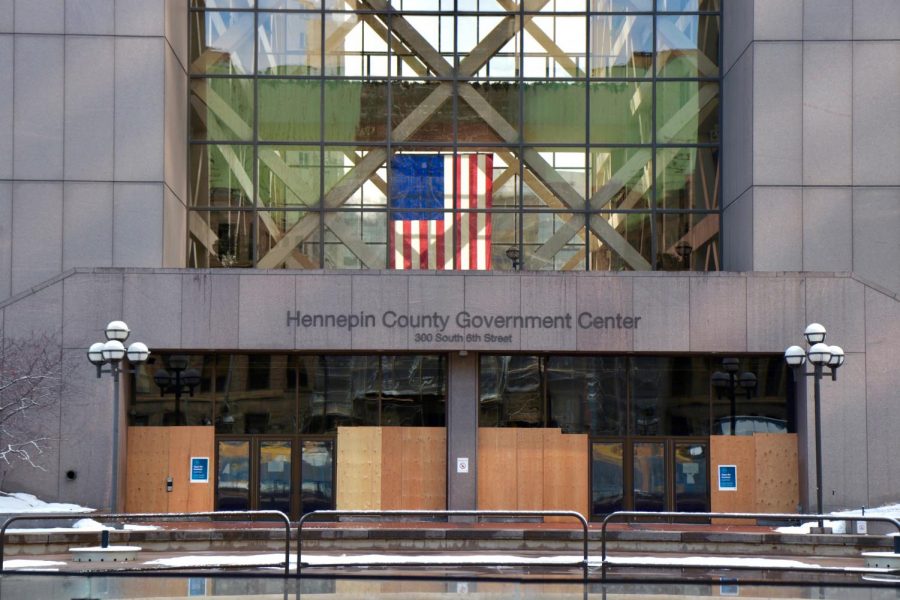Two former Minneapolis Police Department (MPD) officers charged with aiding and abetting second degree murder and second-degree manslaughter in George Floyd’s murder are set to begin their state trial Monday.
Derek Chauvin was convicted of second-degree murder, third-degree murder and second-degree manslaughter in April 2021. Thomas Lane, the third officer that was facing charges, accepted a plea deal in July to serve a 2 ½-year sentence concurrent with his federal sentence and will not stand trial.
Tou Thao, J Alexander Kueng and Lane were convicted of violating Floyd’s civil rights in a federal trial in February and reported to federal prison on Oct. 4. Kueng received a 3-year sentence, Thao received a 3 ½-year sentence and Lane received a 3-year sentence. Chauvin pled guilty to the federal charges against him in December 2021 and is serving a 20-year sentence alongside his 22 ½-year sentence for his state conviction.
If convicted of state charges, Kueng and Thao could face more than 12 years served concurrently with their federal sentence, according to Hennepin County District Court documents.
The trial comes roughly two months after Kueng and Thao rejected a plea deal from the state, which contained a three-year sentence.
The trial was originally scheduled to begin in June, but Thao’s attorneys requested a delay to have an impartial jury following the two-year anniversary of Floyd’s murder.
Michelle Gross is the president of Communities United Against Police Brutality (CUAPB). According to Gross, the community still needs Kueng and Thao to be held accountable despite the delays.
“Justice delayed is justice denied, and it’s made people get to the point where they want to think about other sorts of things … it’s understandable,” Gross said. “At the same time, we do need to have our state statutes and the expectations of police under those state statutes be vindicated.”
Kueng held Floyd’s torso to the ground as Chauvin knelt on his neck for more than nine minutes, killing him. Thao held back bystanders who were filming the officers and pleading with them to stop. Kueng was working as a rookie officer while Thao had roughly nine years of experience with MPD.
Floyd’s murder caused nationwide protests amplifying activists’ calls for racial equity and systemic police reform.
David Schultz is a professor at the University of Minnesota who specializes in state Constitution law. According to Schultz, despite decades of movements for police accountability, it is still “unprecedented” for police officers to be tried for misconduct.
“It’s rare for an officer to be indicted and it’s rare for an officer to be convicted,” Schultz said. “It may be suggesting that we’re moving in a direction more willing to hold police officers accountable … this is pretty significant.”
A state statute was updated in 2020 in response to Floyd’s murder to include additional requirements for officers’ use of force. The updated policy requires officers to intervene and stop another officer if they witness them using clearly unreasonable levels of force and report illegal uses of force to chief law enforcement officers.
According to Schultz, the upcoming trial will set a precedent for whether an officer can be held criminally liable for another officer’s illegal use of force.
Although it is uncommon for a trial to have joint defendants, Kueng and Thao’s cases have relatively similar facts and defenses, Schultz said.
Abigail Cerra worked as a public defender and served on the city’s Police Conduct Oversight Commission for two years until she resigned in 2022. Cerra said she was shocked that Kueng and Thao decided to take their case to trial but said no outcome is guaranteed in court.
“Anything is possible with the jury,” Cerra said. “Any prosecutor, any defense attorney, any judge, they will tell you [that] you don’t know what a jury is going to do … so I guess it just remains to be seen.”
Cerra said she expects Kueng to argue he was operating as a rookie under orders from officers with more experience and Thao to argue he did not restrain Floyd and is therefore not responsible for his death.
Cerra said prosecutors may present Thao’s history of misconduct as evidence in the trial. Thao’s training officer cited him eight times for dishonesty as a rookie, and Thao himself had six police conduct complaints filed against him during his nine-year career with the MPD, the StarTribune reported.
Jury selection will begin Monday
The state is distributing a special juror questionnaire to ensure any selected jurors are as impartial as possible to the case. The questionnaire is divided into six parts: knowledge of the case, media habits, police contacts, personal background, opinions regarding the justice system and availability to serve. Each section contains several questions asking peoples’ knowledge of details related to the case.
According to the questionnaire, jury selection will last until roughly Nov. 4, and the court will submit the case for jury deliberation no later than Dec. 16.
While Kueng and Thao are on trial, the trial itself is more about holding MPD accountable for a history of misconduct, Gross said. In his career with MPD, Chauvin had more than 30 complaints filed against him, including multiple instances in which Chauvin shot people while on duty, according to CUAPB.
Gross said even in Floyd’s case, the public wouldn’t know what happened if it weren’t for recorded videos from bystanders. MPD initially reported Floyd’s cause of death to be a “medical incident.”
“The reality is, what’s really on trial is police culture,” Gross said. “I’m fearful that if [Kueng and Thao] are acquitted … [MPD’s policing] will just be business as usual.”




















